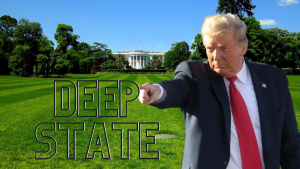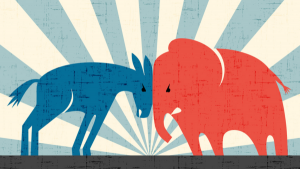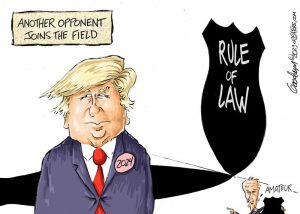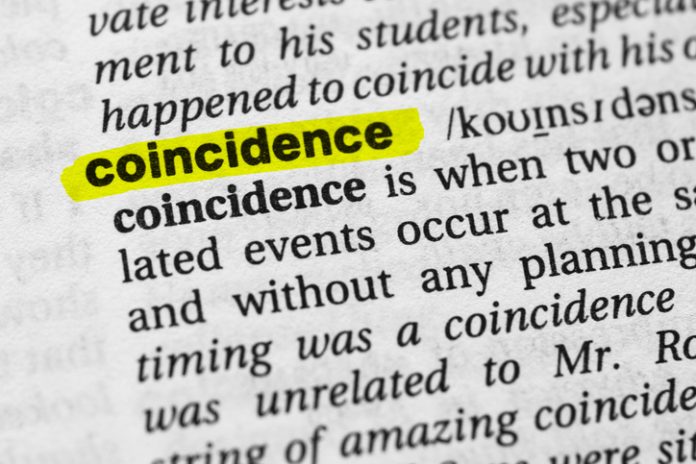Life, Liberty, Property #20: Trump indictment much more than an interesting coincidence on the day FBI agreed to let Congress read Hunter Biden document.
SUBSCRIBE to Life, Liberty & Property (it’s free). Read previous issues.
IN THIS ISSUE:
- Trump Indictment: Much More Than an Interesting Coincidence
- Why People Lie in Court
- Homicide Rates Are Down—Why?
- Possible Silver Lining for GOP in Lame Debt Ceiling Deal
- Cartoon
Trump Indictment: Much More Than an Interesting Coincidence
 The very day the Oversight Committee of the U.S. House of Representatives canceled a Contempt of Congress vote against FBI Director Christopher Wray after the latter agreed to turn over a witness file containing bribery allegations against President Joe Biden stemming back to his days as vice president of the United States, Donald Trump—former president and current poll leader among prospective 2024 presidential candidates—informed us that he has been indicted for mishandling presidential documents.
The very day the Oversight Committee of the U.S. House of Representatives canceled a Contempt of Congress vote against FBI Director Christopher Wray after the latter agreed to turn over a witness file containing bribery allegations against President Joe Biden stemming back to his days as vice president of the United States, Donald Trump—former president and current poll leader among prospective 2024 presidential candidates—informed us that he has been indicted for mishandling presidential documents.
The very same day. How about that?
This extraordinary coincidence illustrates an important trend in American life: the use of criminal prosecutions and civil lawsuits as political weapons. With a gross profusion of federal, state, and local laws in place, many of them hundreds of pages in length and larded with ambiguities and internal and external contradictions, it is easy to find some legal breach with which to charge someone whose policies you oppose or whom you simply dislike.
This costs your enemy time, effort, and money.
It is entirely dishonorable, but politics has always been conducted less honestly than nearly any other human endeavor.
Trump spent literally his entire presidency fighting off bogus charges by contemptible charlatans in Congress, in the media, and elsewhere—and some claims that might just have some merit. There is no way of knowing if any of these efforts at lawfare have any basis in truth, because the pattern of malicious use of courts to harass Trump has been so strongly established. A sensible person would find it very difficult to believe any of them, given Trump’s vindication in the biggest cases. It is easy to get a New York City jury to convict a prominent Republican in a civil case, much harder to prove it to a national audience and especially any fair-minded person.
These activities naturally undermine respect for the courts, coincidentally (or not) at a time when the Left is trying to encourage the public to disdain the U.S. Supreme Court—which was until recently one of the Left’s most powerful and reliable weapons.
The corruption of a nation’s justice system, vividly illustrated by the regular use of it for political dirty tricks, sends a message to everyone: you could be next, so don’t get your head above the rampart. Trump is right to argue that the legal war against him is meant to send a message to his supporters, the tens of millions of Americans who have come to see their government as having been bought and paid for by powerful business and cultural interest groups.
The more prominent the individuals under attack in these law wars, the more threatening this prosecutorial and plaintiff power becomes for the public. Meanwhile, the use of prosecutorial discretion to thwart the removal of violent criminals from the streets further demonstrates the ability of government to manipulate systems to harass and destroy its enemies—and its increasing willingness to do so.
The treatment of Joe Biden has been a great contrast with that of Trump. The media have continually and ruthlessly suppressed reports of shady dealings in which Biden has allegedly been involved, and Biden’s administration has predictably slow-walked any investigations of him and kept a tight hold on any alleged evidence against him, most notably in regard to schemes by his son Hunter—from which Joe Biden may have benefitted financially and in other ways. In the first two years of his administration, a Congress with razor-thin Democrat majorities in both houses performed no oversight of Biden, and the press and media followed suit dutifully.
In addition to all of that, whenever Biden did something embarrassing or some damaging information managed to leak out, it just happened that a large distraction would arise.
As happened last Thursday.
Now, with a Republican majority in the House, investigations into Biden are starting to gain some ground. Time to indict Trump. What an interesting coincidence.
Public trust in government is at a historic low. The American people have watched this bizarre drama unfold, with the Left exulting, the Right grumbling, and the shrinking center holding fire. No one wants to risk his or her share of the prosperity America enjoys, solely for the sake of a few politicians under fire. With the growing clarity that the common people are the real target, however, it seems unlikely that this tense standoff can last much longer.
No form of government, no legal system, no human system of any kind can work well when the people’s morals have been corrupted. In addition, every system of government eventually becomes corrupted and corrupts the people. That has clearly become the case with the United States, as the public looks on in wonder and inaction, fearing to risk their own comfort and safety, at the transformation of politics from blood sport to mutual assured destruction, and of our political and legal systems into a national Doomsday Machine.
This cannot last, so it won’t.
Sources: The Associated Press; The New York Times
Why People Lie in Court
 In an obviously related matter, John Lott of the Crime Prevention Research Center (CPRC) notes that there are strong positive incentives for people to lie in court and when making accusations in other forums. Lott quotes a law professor friend of the CPRC as saying that people routinely engage in “white lies” in everyday life when “the expected benefit of the lie outweighs the expected cost—if any—incurred by lying,” such as avoiding a scene by saying another person looks good.
In an obviously related matter, John Lott of the Crime Prevention Research Center (CPRC) notes that there are strong positive incentives for people to lie in court and when making accusations in other forums. Lott quotes a law professor friend of the CPRC as saying that people routinely engage in “white lies” in everyday life when “the expected benefit of the lie outweighs the expected cost—if any—incurred by lying,” such as avoiding a scene by saying another person looks good.
This effect extends to people lying in court, because “people are rarely convicted of perjury and police are virtually never convicted, even though there is substantial evidence of them lying,” the law professor explains:
We need only extend these same ideas when considering why people lie in court: they think that they have more to gain from the lie than by telling the truth, and they perceive … very little risk of a prosecution for perjury. In criminal cases, the incentives may be accentuated: the criminal who turns “state’s evidence” to incriminate someone else in exchange for immunity or a reduced sentence faces almost no prospect of punishment for lying, so long as his or her testimony is sufficiently incriminating to the prosecutor’s preferred target.
Certainly, the same is true in civil cases: if the local prosecutor has an animus against the person you’re lying about, he or she is unlikely to punish you for false testimony in a civil suit. This is especially the case when a prosecutor has repeatedly declared himself a sworn enemy of your target.
In another blog post, Lott notes that a recent study found 92 percent of child abuse accusations in Texas in 2022 were unsubstantiated, and the percentage of false accusations may be even higher than that. “For those worried about people using the legal system to be vindictive or to harm innocent people, the extremely high false accusation rate here should be a concern,” Lott writes.
The same process applies to accusations made through the press: if the most powerful media voices are united in opposition against the person you are accusing, they will broadcast your assertion widely and without questioning it, to the considerable benefit of your reputation, and they will suppress any stated doubts about your claims, greatly reducing your risk of exposure as a liar.
As the child abuse example illustrates, the consequences for the accused can be ruinous, while the accuser faces no risk at all.
Prosecutors’ willingness to turn a blind eye to false accusations, and the increasing use of anonymous or otherwise-protected informants, intensify the corruption of the nation’s legal system and its use as a weapon against those perceived as enemies of the state.
Sources: Crime Prevention Research Center; Crime Prevention Research Center
Homicide Rates Are Down—Why?
 Many of the nation’s biggest cities have enjoyed a reduction in homicide rates in the first five months of the year, the research firm AH Datalytics has found.
Many of the nation’s biggest cities have enjoyed a reduction in homicide rates in the first five months of the year, the research firm AH Datalytics has found.
“[T]he homicide rate has fallen roughly 12% nationwide when compared with the first five months of 2022,” The Washington Times reports in a story on the study.
Big decreases in homicide have occurred in the largest cities, and smaller-percentage declines have been reported in some of the most crime-plagued midsized cities, the paper reports:
The firm, which references publicly available police data, shows that Chicago has seen a 5% drop in killings, while New York City has seen a nearly 14% decline in homicides. Stark drop-offs also were recorded in Philadelphia (24%), Los Angeles (27%) and Houston (28%).
The trend also includes mid-sized cities that typically struggle with crime, such as Baltimore (down 15%), Detroit (down 10%) and St. Louis (down 10%).
New Orleans—which had the highest murder rate in the country last year—has seen a 15% drop in its number of recorded homicides through May.
The news is not all good. Homicide has increased this year by 38 percent in Memphis, 30 percent in Cleveland, and 15 percent in Washington, D.C., the report states. The nation’s capital reached 100 homicides this year at the earliest date in 20 years, WUSA9 reports.
In addition, at this point there is no way of knowing whether the decreases will be sustained through the rest of the year and thereafter, the study author observes.
The Associated Press indicates the easing of the murder rate in these cities results from municipal governments dialing back on the Defund the Police movement and local district attorneys’ reluctance to prosecute crimes:
Officials in Cleveland; Newark, New Jersey; and Philadelphia have announced summer plans to make officers more of a visible presence in locations where violent crimes have happened, while also promoting community efforts to prevent violence and provide alternative activities.
In Baltimore, city officials—not police officers—will enforce curfews on teenagers starting Friday and continuing through Labor Day weekend. The controversial policy has long been on the books but rarely enforced.
“We are going back to the old days,” Baltimore Mayor Brandon Scott said in announcing the summer enforcement, after two teens were wounded as hundreds gathered on a Sunday night in the city’s popular Inner Harbor district. …
In Detroit, federal prosecutors are expanding efforts to help local police this summer by taking armed carjacking cases and business robberies in high-crime areas, in addition to certain gun crimes. Federal convictions typically bring longer sentences.
Crime rates rose rapidly in 2020 as cities across the nation adopted soft-on-crime policies, and they are still far above the numbers that preceded that annus horribilus.
The AP story suggests the increasing use of volunteers to intercede to defuse situation before they escalate to violence is proving effective, though providing only anecdotal evidence and not much of it at that.
The D.C. Police Union, by contrast, released a statement quoting its chairman, Gregg Pemberton, as tracing the persistent increases in crime to a simple failure to provide police protection as had been done in the years prior to 2020:
“This increase in crime is due to the DC Council’s implementation of misguided ‘“police reform’ legislation,” [Pemberton said] … “The Council’s actions have had a chilling effect on professional and responsible policing and caused over 1,200 police officers to leave the agency. … Congress recently took up a disapproval of this law, which passed the House and the Senate with bipartisan support; however, President Biden vetoed the effort, leaving DC residents stuck with these radical, anti-cop/pro-criminal laws.
A decrease in homicide is certainly good news. It is important, however, to know just why it has happened, so that we can know what policies work and which do harm. At present, there is nothing in the available facts to contradict the obvious, time-tested observation that policing and prosecution are necessary elements in combatting crime. When “crime does not pay,” you get less of it.
Sources: The Washington Times; U.S. News and World Report; WUSA9; National Fraternal Order of Police
Possible Silver Lining for GOP in Lame Debt Ceiling Deal
 In the runup to the debt ceiling deal, I was a bit concerned that a fiscally and economically positive resolution—Republicans getting all or nearly all of what they were asking for in the Limit, Save, Grow Act—could turn out to be a Pyrrhic victory.
In the runup to the debt ceiling deal, I was a bit concerned that a fiscally and economically positive resolution—Republicans getting all or nearly all of what they were asking for in the Limit, Save, Grow Act—could turn out to be a Pyrrhic victory.
That was a plausible scenario: the debt ceiling deal results in some mild curbs on federal spending and regulation per GOP insistence, followed by a recession that was going to happen anyway, and the Republicans get blamed for the economic downturn and the Great Immiseration that ensues.
The Biden administration, the congressional Democrats, and the media would surely claim that the Republicans’ spending cuts damaged the economy and threw millions of people into desperate circumstances. Plenty of video of awful conditions that have already existed for years in California and other Democrat-run places would be provided as visible proof of damage done by the Republicans’ perfidy. The public, not trained in economics and hence unable to spot the fundamental flaws in Keynesian thinking, would, upon continual urging by the press, think post hoc ergo propter hoc and blame the Republicans for the recession.
The biggest issue for the public would thus have turned against the fiscally less-irresponsible party in the 2024 elections. Economic policies would consequently become even more disastrous in 2025.
The Republicans’ feebleness and President Joe Biden’s crowing about his great success in the deal averts that scenario. Biden and his party own the deal.
The scenario is now very different: the debt ceiling deal, with Democrats getting pretty much everything they want, is followed by a recession that was going to happen anyway. The Democrats and the press (but I repeat myself) blame it on the Republicans according to the natural order of things, but it is less plausible because they all bragged so much about having got what they wanted.
Perhaps this time the Republicans have reversed their customary practice of snatching defeat from the jaws of victory and have stumbled into a less-ruinous outcome than usual.
Not that they deserve any credit for it.
Source: American Thinker
Cartoon

via Comically Incorrect
For more Rights, Justice, and Culture News.
For more great content from Budget & Tax News.











